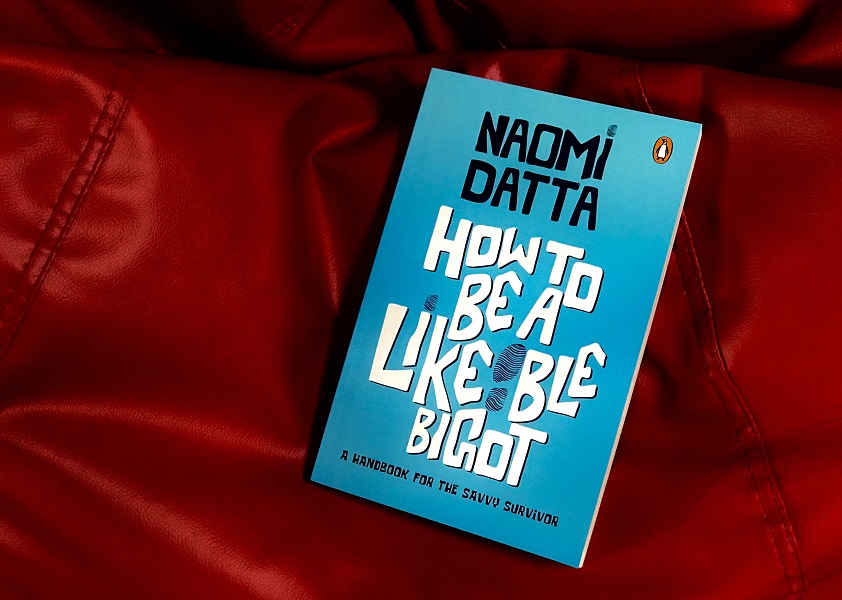Are you the shallow, insular self contained wallflower that Naomi Dutta waxes eloquent about in her book, of how-to’s and whatnot, How to be a Likeable Bigot? Jokes aside, Dutta’s book very smoothly sails through a myriad of scenarios that should either have you in splits or, leave you feeling offended.
Either way, if you’re on a quest to achieve the ordinary, blend in and be largely forgettable, you may find the following excerpts almost relatable!
- Put it on email
Please note that this is the only time you will show initiative, but for a larger cause: initiative to bring about inertia. It isn’t rocket science, but it could be physics. Every action has an equal and opposite reaction. By proactively setting off an email chain, you are bringing about inactivity. It looks like a lot of activity but its marginal productivity is zero. They have a term for this in high school economics: disguised unemployment.
- The Art of managing WhatsApp groups at work
Send messages at unearthly hours. Make sure to send messages to the group at odd hours to appear ever alert and wakeful. The messages don’t have to be of any import, but will shame the rest of the group as they try to sleep, eat or do anything apart from Top Priority 101.
- You are a mass of inertia, but your career will always be on a steady ascendant
Our key objective to stay in one organization for as long as possible – stay the course, survive management changes, blend in, be seen as a company loyalist and inveigle yourself into some mid-senior managerial post. That is ideal. You are the person who throws the rule book at new employees and resists all change by saying that it is against the brand values of the company.
- Words that should definitely find their way into your resume:
Ideas curator/ aggregator: You have never actually had an original idea in your life but are really good at filching ideas. Which means that you have the elusive ability to detect a good idea and then pass it off as your own. You were made for senior management. Go ahead and describe yourself as an ideas curator.
Digital Evangelist: You can use ‘evangelist’ on its own as well, but attaching digital to anything automatically makes it sound modern and cutting-edge. An evangelist is a passionate advocate for something, so if you are the most passionate setter-up of work WhatsApp groups, you are a digital evangelist.
- No productive person values their lunch hour
This could be potentially the biggest sacrifice this book entails. Do not tell people on social media what you eat everyday – no daily lunch hour updates. A truly productive person is one who strategically schedules meetings that eat into lunch hour or one who proposes a working lunch. If you have the time to post photos online of your lunch, you have the time to eat lunch, which can only mean that you are shirking something that could potentially alter the course of humanity – such as working on an Excel sheet with details of how many cups of coffee team members have in a day and correlating it to performance.
- How not to look idle on social media
Be Well- Referenced: You don’t need to be well-read. The key is to be well-referenced. Post links to articles on a wide variety of topics, preferably from international publications on things that are of little or peripheral interest to the catchment. Like Brazil going right wing or the repercussions of Brexit on Lebanese eateries in London. Do not add your agreements or disagreements with any of these posts. Merely say, ‘interesting perspective’ or ‘an off-centre take on something that has been preoccupying me for a bit’ or ‘this does raise some interesting points’.
- Active participation has nothing to do with the intensity of involvement
Treat Social Media like a spectator sport. Part of the reason why we love being on social media is because there is always a high probability of a fight going on somewhere. Divergent opinions clash, people get snarky and all of this can get the adrenaline going. But here’s the thing: you don’t need to be an active participant because: i.) that gives you visibility which we don’t want; and ii.) it is finally work, which we absolutely don’t want.
- Instagram is a great platform to give you the fame of non-achievement
Photograph everything. Invest in a good camera phone and shoot everything. If you are a woman, most of your followers will be quite happy if you post a ‘Good Morning’ selfie everyday. But don’t do this as a vanity exercise. Be sure to write a few words of inspiration…
You don’t have to be penning your own motivational quotes. Luckily for us, Rumi, Gibran and many other great writers, have left us a handy bank of quotes that can be used for anything.
We both know that this has the potential to become long winded but we’d love for you to check out the outrageously witty satire How To Be A Likeable Bigot by Naomi Dutta and tell us what you thought of it!








